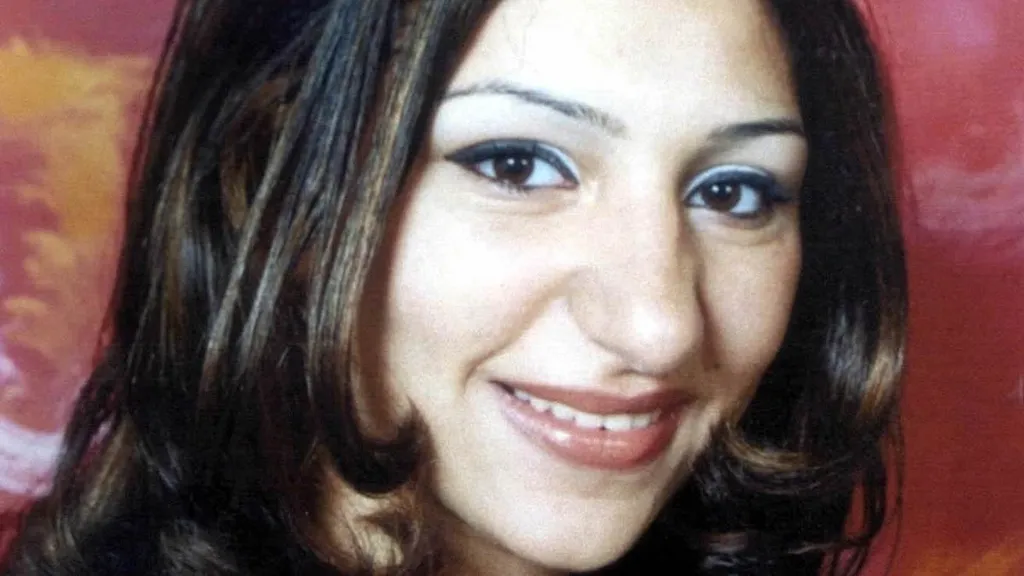A Kurdish migrant who murdered his own daughter in what would become known as the UK's first official honour killing has been deported to Iraq.
Abdalla Yones, 69, cut his 16-year-old daughter Heshu's throat and then tried to kill himself and later pleaded in court for the 'death sentence'.
The strict Muslim frenziedly attacked Heshu at their home in Acton, west London, on October 12 2002, believing she had become too westernised.
Popular and fun-loving, Heshu had planned to run away from home after starting a relationship with an 18-year-old Lebanese Christian boy.
Yones was sentenced to life at the Old Bailey in 2003 after admitting the murder. He was given a minimum jail term of 14 years.
MailOnline has discovered that the killer was deported to Iraq at the end of his minimum sentence.
This is despite the fact he had fled Saddam Hussein's tyrannical regime during the first Gulf War and had been given asylum.
Hussein was toppled during the second Gulf War and executed on the 30th December 2006.
The Home Office authorised Yones to be deported and he was removed from the prison system in April 2017.
It used the 2012 Tariff-Expired Removal Scheme (TERS) under which foreign inmates with indeterminate sentences can be booted out of the UK.
Yones was eligible because he had served his minimum term and had a life sentence.
MailOnline understands that he had a Parole Board review in 2014, which recommended he be moved to an open prison.
A spokesperson for the Home Office said: 'It is our longstanding policy not to comment on individual cases.'
It also stated that it was policy to consider foreign national convicted of a crime and given a prison sentence for deportation at the earliest opportunity.
At his trial, the jury heard that Yones had never adjusted to life in the UK, unlike his family and particularly Heshu.
The A-level student attended William Morris Academy in Fulham, where she began a relationship with a fellow pupil.
Police said she appeared to have been the victim of serious domestic violence before the murder.
And they revealed a letter which Heshu wrote to her parents, apparently just days before she planned to run away.
It read: 'Bye Dad, sorry I was so much trouble.
'Me and you will probably never understand each other, but I'm sorry I wasn't what you wanted, but there's some things you can't change.
'Hey, for an older man you have a good strong punch and kick.
'I hope you enjoyed testing yourstrength on me, it was fun being on the receiving end. Well done.'
The court was told the abuse culminated in Yones smashing his way into the bathroom where Heshu had barricaded herself.
He stabbed her multiple times and cut her throat, before cutting his own throat and throwing himself off a balcony.
While in hospital, Yones claimed that al-Qaeda were responsible for Heshu's murder.
Yones, who was an active member of the Patriotic Union of Kurdistan (PUK), fighting for them from 1980 until 1991, was described as 'a fish out of water' in the UK.
He is said to have become depressed.
Sentencing Yones, Judge Neil Denison said the Kurd was still suicidal: 'This is, on any view, a tragic story arising out of irreconcilable cultural differences between traditional Kurdish values and the values of western society.'
Icah Peart QC, defending Yones, said that before the murder his client had received a letter, written in Kurdish, describing his daughter as a slut who was sleeping with her boyfriend on a daily basis.
'He was disgusted and distressed by the letter, which he threw away in his anger,' said Mr Peart.
It is not known whether Yones is still alive in Iraq.
Commander Andy Baker said Heshu had suffered 'very significant physical abuse' in the months leading up to the killing, but it was never reported to police.
'We've got to stop it; we can prevent these murders,' he said, adding that a handful of people still believed it was an appropriate cultural response.
Heshu's case was the first in the United Kingdom to be legally recognised and prosecuted as an honour killing.
It led to the creation of a specialist task force in honour-based violence and, subsequently, to the reviewing of more than 100 previous cases of murder and suicide for any indication that 'honour' was a factor.
This week marked the National Day of Remembrance for Honour Killings with activists tirelessly campaigning to end the abuse but facing a worldwide battle to stop the barbaric practice.
